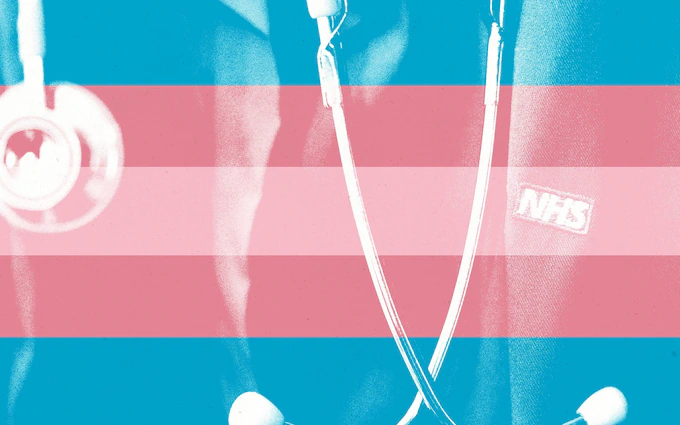General Medical Council pressing ahead with its new policy of making it voluntary for medics to record any data on their gender or sex

Transgender doctors will be able to hide their biological sex from the public despite the Supreme Court’s landmark ruling.
The General Medical Council (GMC) has until now kept a record of the gender of all registered doctors in Britain. This was previously interpreted to mean sex recorded at birth, but in recent years has increasingly included gender identity.
But The Telegraph can reveal that the regulator is now in the process of making it voluntary for doctors to record any data on their gender or sex.
The move is likely to make it harder for female patients to ensure that they receive care from a doctor of the same sex, which is not a legal right but can be requested.
The GMC has confirmed it is pressing ahead with its new policy – despite the Supreme Court’s ruling this week that a woman is defined by biological sex – but said it would consider the ruling in due course.
In a letter sent to Baroness Hayter, a Labour peer, earlier this month, the GMC said it was updating its regulations “to remove the requirement for a doctor’s gender, or sex, to be recorded on the Register”.
Charlie Massey, the chief executive, wrote: “We have now started this work to bring doctors into line with the approach we take for PAs [physician associates] and AAs [anaesthesia associates]. We would continue to collect such data on a voluntary basis as part of our routine diversity monitoring data collection. We will consider precisely what data to collect when we undertake the aforementioned work to update our approach to collecting and using equality, diversity, and inclusion data.”
Mr Massey said it was up to patients to request treatment from a same-sex doctor, saying “local healthcare providers are best placed to respond to such requests at the point at which care is accessed”.
He wrote: “It is our understanding that there is no legal right for patients to be treated by a doctor of a certain sex.”
The law does not give an explicit right for patients to be treated by a doctor of the same sex. However, patients can request this from their NHS trust, though it may delay treatment.
The previous government proposed that the right to request a doctor of the same sex be added to the NHS constitution, but the update was not implemented before the general election.
The Telegraph understands that Wes Streeting, the Health Secretary, is supportive of same-sex care in the NHS wherever possible.
However, the decision to phase gender and sex data out of the public record could leave the NHS unsure of the gender or sex of its own doctors.
It is understood that Mr Streeting has reminded the GMC of keeping accurate data on doctors.
‘Public sector bodies must comply’
A Government spokesman said: “This is the law, and we expect all public sector bodies to comply.
“The ruling has provided much-needed confidence and clarity for the NHS to adapt its policies, as it reviews its ‘Delivering same-sex accommodation’ guidance, to ensure that same-sex spaces are always protected.”
However, Lady Hayter, a leading gender-critical Labour peer, told The Telegraph: “The Supreme Court ruling makes it clear for the NHS that single-sex wards will mean biologically single-sex wards. Similarly, for female patients, if they ask to see a woman doctor they surely have the right to know that it is a biologically female doctor because that will be the intention behind their request.
“The GMC needs to consider this and keep their register of doctors appropriately so that all patients can know the sex of the physician.”
The move comes after an NHS nurse was suspended for challenging a trans doctor who used the women’s changing room after claiming to be biologically female.
Dr Beth Upton claimed to be biologically female despite being born male. After changing gender, Dr Upton was given a new registration number and record by the GMC and listed as a female doctor.
Sandie Peggie, the nurse who used the same changing room, took NHS Fife to tribunal over her suspension, claiming discrimination and harassment. Her case has been adjourned until July.
The GMC has previously come under fire from Mr Streeting for its approach to trans doctors.
The medical register is intended to give transparency about doctors’ qualifications, behaviour and conduct.
But in February The Telegraph revealed that the regulator was awarding new registration numbers to doctors who changed gender, wiping records of any past wrongdoing from the record.
Mr Streeting said the practice should “not have been allowed” and called for the body to overhaul its handling of sex and gender data.
‘Confusing data leads to negative outcomes’
The GMC’s letter to Lady Hayter was sent on April 3 following the publication of the Sullivan Review, which said that the NHS and police forces should collect data on biological sex rather than gender.
It said that widespread confusion around sex and gender had negative outcomes, including artificial increases in female offending rates on police records and inappropriate medical care for trans people on the NHS.
The review name-checked the GMC for predominantly recording gender over sex data on the medical record.
However, it acknowledged that the act of Parliament setting out the role of the GMC referred to “gender” rather than “sex”, which had created confusion in recent years with “the supplanting of sex by gender”.
Lady Hayter added: “Either the GMC should take the decision that gender does mean sex, or if they feel that they haven’t got legal backing for that, they should ask the government to make the necessary amendment to the legislation.”
Other gender-critical activists criticised the GMC’s policy, with Fiona McAnena, director of campaigns at Sex Matters, telling The Telegraph: “This looks like a petulant response to evidence that basing records on ‘gender identity’ was harmful and unsatisfactory.
“This cannot be in the best interests of patients. It is obvious that for informed consent and patient wellbeing, patients may need to know the sex of a doctor, particularly when it comes to intimate procedures.”
Ms McAnena added: “In light of the Supreme Court judgment this week, the GMC needs to accept that the days of putting the wishes of trans-identifying male doctors ahead of the safety and dignity of female patients are over.”
A spokesman for For Women Scotland, the activist group whose lengthy legal campaign resulted in the Supreme Court’s ruling, said: “The GMC cannot put the demands of male doctors above the health and safety of women.”
A GMC spokesman said: “Our policies will always comply with the law.
“We note the ruling of the Supreme Court. We will review the judgment in full and carefully consider its relevance to our own policies and processes.”
Source: The Telegraph
